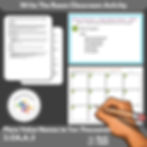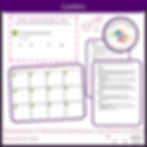Developing strong research and writing skills is crucial for students' academic success. However, many students face challenges in these areas. This article explores practical strategies through real-life case studies of students who improved their research and writing abilities. By understanding their journeys and the tailored interventions used, educators can adopt similar approaches to support their students.
Key Takeaway
Through structured activities and targeted support, students can significantly enhance their research and writing skills. Individualized Education Program (IEP) goals and objectives play a vital role in this process, providing clear benchmarks for progress.
Researching and Writing to Convey Understanding
Case Study: Emily's Research Skills
Emily, a fifth-grader, struggled with conducting research and summarizing information. By using structured research activities, Emily improved her ability to find and use reliable sources.
IEP Goal: By (date), Emily will research and write to convey understanding of a topic using at least one resource, improving research skills from [current level] to [target level] as measured by teacher evaluations.
Objectives:
Emily will identify and use at least one reliable source for research in 8/10 trials.
Emily will summarize information from the source in her own words in 8/10 trials.
Emily will organize researched information into a coherent written piece in 8/10 trials.
Writing Clear, Focused Main Ideas and Supporting Details
Case Study: Jacob's Writing Clarity
Jacob, a sixth-grader, often wrote essays that lacked clear main ideas and supporting details. Through focused practice, Jacob learned to write more clearly and provide relevant details.
IEP Goal: By (date), Jacob will write clear, focused main ideas and supporting details on a topic, improving writing clarity from [current level] to [target level] as measured by rubrics and teacher observations.
Objectives:
Jacob will state a clear main idea for a topic in 8/10 trials.
Jacob will provide relevant supporting details in 8/10 trials.
Jacob will revise writing to enhance focus and detail in 8/10 trials.
Writing Multiparagraph Passages
Case Study: Olivia's Essays
Olivia, a seventh-grader, struggled with developing her ideas into multiparagraph passages. Through structured writing activities, Olivia learned to organize her thoughts into well-developed passages.
IEP Goal: By (date), Olivia will write a multiparagraph passage to develop a topic using details, examples, and illustrations, improving organizational skills from [current level] to [target level] as measured by writing samples.
Objectives:
Olivia will write an introduction, body, and conclusion in a passage in 8/10 trials.
Olivia will include examples and illustrations to support the main idea in 8/10 trials.
Olivia will use transitional phrases to connect ideas between paragraphs in 8/10 trials.
Revising Writing for Development of Main Idea
Case Study: Ethan's Revisions
Ethan, a fifth-grader, had difficulty revising his writing to develop the main idea with supporting details. Through guided revision sessions, Ethan improved his ability to enhance his writing.
IEP Goal: By (date), Ethan will revise writing for development of the main idea with supporting details, improving revision skills from [current level] to [target level] as measured by teacher evaluations.
Objectives:
Ethan will identify areas in his writing that need additional support in 8/10 trials.
Ethan will add relevant details to support the main idea in 8/10 trials.
Ethan will improve the clarity and coherence of his writing through revision in 8/10 trials.
Researching Using Verifiable Sources
Case Study: Ava's Research Skills
Ava, an eighth-grader, struggled with using multiple verifiable sources for her research. Through targeted instruction, Ava learned to identify and use reliable sources effectively.
IEP Goal: By (date), Ava will research using verifiable sources to develop and support a topic, improving research skills from [current level] to [target level] as measured by teacher evaluations.
Objectives:
Ava will identify and use multiple verifiable sources for research in 8/10 trials.
Ava will integrate information from sources into her writing in 8/10 trials.
Ava will cite sources correctly in her work in 8/10 trials.
Conveying Understanding of a Topic Using Multiple Resources
Case Study: Liam's Comprehensive Research
Liam, a seventh-grader, had difficulty synthesizing information from multiple sources. Through structured research projects, Liam improved his ability to convey a thorough understanding of topics.
IEP Goal: By (date), Liam will research and write to convey a thorough understanding of a topic using two or more resources, improving comprehensive research skills from [current level] to [target level] as measured by teacher evaluations.
Objectives:
Liam will find and use at least two reliable sources for research in 8/10 trials.
Liam will synthesize information from multiple sources into a coherent text in 8/10 trials.
Liam will present researched information clearly and accurately in 8/10 trials.
Including Relevant Facts and Details
Case Study: Isabella's Factual Writing
Isabella, a sixth-grader, struggled with including relevant facts and details in her writing. Through targeted practice, Isabella improved her ability to integrate factual information into her essays.
IEP Goal: By (date), Isabella will include some relevant facts and details on a chosen topic, improving factual writing skills from [current level] to [target level] as measured by teacher evaluations.
Objectives:
Isabella will identify relevant facts for a chosen topic in 8/10 trials.
Isabella will include appropriate details in her writing to support the main idea in 8/10 trials.
Isabella will ensure all included facts are accurate and relevant in 8/10 trials.
Conveying Main Ideas and Supporting Details for Various Audiences
Case Study: Jack's Audience-Specific Writing
Jack, a seventh-grader, had difficulty tailoring his writing for different audiences. Through targeted exercises, Jack learned to adjust his writing to meet the needs of various audiences.
IEP Goal: By (date), Jack will convey clear, focused main ideas and supporting details on a topic for a variety of audiences and purposes, improving audience-specific writing skills from [current level] to [target level] as measured by teacher evaluations.
Objectives:
Jack will identify the target audience for his writing in 8/10 trials.
Jack will tailor his main idea and supporting details to suit the audience in 8/10 trials.
Jack will revise his writing to ensure it meets the needs of the audience in 8/10 trials.
Ensuring Content Accuracy
Case Study: Mia's Fact-Checking
Mia, a fifth-grader, often included inaccurate facts in her writing. Through targeted instruction, Mia learned to verify her information and ensure content accuracy.
IEP Goal: By (date), Mia will include appropriate facts and details on a chosen topic, improving content accuracy from [current level] to [target level] as measured by teacher evaluations.
Objectives:
Mia will research and gather accurate facts for a chosen topic in 8/10 trials.
Mia will integrate relevant details to enhance her writing in 8/10 trials.
Mia will review and revise her writing to ensure all facts are correct in 8/10 trials.
Generating Learning Logs and Journals
Case Study: Emma's Reflective Writing
Emma, a sixth-grader, struggled with using writing to reflect on her learning. Through structured journaling activities, Emma learned to maintain learning logs and journals effectively.
IEP Goal: By (date), Emma will use writing to generate a learning log and journals to record new information, improving reflective writing skills from [current level] to [target level] as measured by teacher evaluations.
Objectives:
Emma will maintain a learning log to record new information learned in 8/10 trials.
Emma will write journal entries reflecting on new information and experiences in 8/10 trials.
Emma will use her learning log and journals to track progress and insights in 8/10 trials.
Using Writing to Generate Various Learning Tools
Case Study: Lucas's Writing Skills
Lucas, a seventh-grader, had difficulty using writing to create learning tools. Through targeted practice, Lucas learned to generate diagrams, learning logs, journals, note-taking, outlines, and summaries.
IEP Goal: By (date), Lucas will use writing to generate diagrams, learning logs, journals, note-taking, outlines, and summaries, improving various writing skills from [current level] to [target level] as measured by teacher evaluations.
Objectives:
Lucas will create diagrams to illustrate concepts in 8/10 trials.
Lucas will maintain detailed learning logs and journals in 8/10 trials.
Lucas will take notes, create outlines, and write summaries to support learning in 8/10 trials.
Incorporating structured and targeted research and writing activities into the classroom can significantly improve students' abilities to convey understanding through their writing. Each of the case studies—Emily, Jacob, Olivia, Ethan, Ava, Liam, Isabella, Jack, Mia, Emma, and Lucas—demonstrates the effectiveness of personalized IEP goals and objectives in addressing specific challenges. By setting clear, measurable goals and providing consistent support, educators can help students develop essential skills that are critical for their academic success and future endeavors.
As we’ve seen, through strategic interventions and continuous practice, students can enhance their research, summarizing, organizing, and writing abilities. This not only boosts their confidence but also prepares them for more complex academic tasks ahead.
Explore our IEP Goal Bank, Lesson Plan Templates, and TeachTastic Store for more resources and tools to support your teaching.
Let's continue to equip our students with the skills they need to succeed.

































